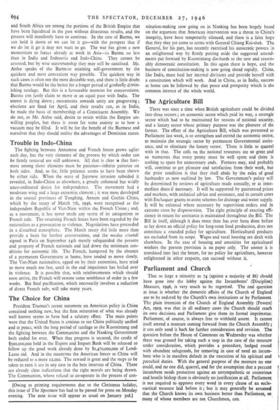The Choice for China
President Truman's recent statement on American policy in China contained nothing new, but the firm reiteration of what was already well known seems to have had a salutary effect. The main points were that the United States is anxious to see China politically unified and at peace, with the long period of tutelage to the Kuomintang and the fighting between the Communists and the Nanking Government both ended for ever. When that progress is secured, the credit of $500,000,000 held in the Export and Import Bank will be released to follow up the good work already done by $1,47o,000,000 of Lend- Lease aid. And in the meantime the American forces in China will be reduced to a mere 12,000. The reward is great and the steps to be taken to earn it are in any case in the best interests of China. There are already clear indications that the right morals are being drawn.
The Communists, whose refusal to co-operate in the process of con- . stitution-making now going on in Nanking has been largely based on the argument that American intervention was a threat to China's integrity, have been temporarily silenced, and there is a faint hope that they may yet come to terms with General Chiang Kai-shek. The General, for his part, has recently exercised his autocratic powers in an enlightened way by firmly putting aside the suggested amend- ments put forward by Kuomintang die-hards to the new and reason- ably democratic constitution. In this again there is hope, and the business of constitution-making is now going ahead rapidly. China, like India, must heal her internal divisions and provide herself with a constitution which will work. And in China, as in India, success at home can be followed by that peace and prosperity which is the common interest of the whole world.






























 Previous page
Previous page